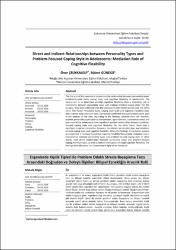Direct and Indirect Relationships between Personality Types and Problem-Focused Coping Style in Adolescents: Mediation Role of Cognitive Flexibility
Abstract
The first aim of this research is to examine the relationship between personality types, problem-focused stress coping style, and cognitive flexibility in adolescents. The second aim is to determine whether cognitive flexibility plays a mediating role in relationship between personality types and problem-oriented coping styles. For this purpose, data were collected from 465 adolescents (293 (63%) women and 172 (37%) men). Five Factor Personality Scale, Coping Style Scale and Cognitive Flexibility Scale were used as data collection tools. Correlation coefficient and path analysis were used in the analysis of the data. According to the findings obtained from the research, positive personality types such as extraversion, agreeableness, conscientiousness and openness of the adolescents have significant positive relationships between problem-focused coping style and cognitive flexibility. On the other hand, there was a significant negative correlation between neuroticism personality type and problem-focused coping style and cognitive flexibility. When the findings of mediation analysis are examined, it has been found that cognitive flexibility has partially mediation role in relationships between personality types and problem-focused coping style. In other words, both direct relationships between personality types and problem-focused coping are meaningful, as well as indirect implications through cognitive flexibility. The findings were discussed and interpreted in light of the literature.
Source
Cukurova University Faculty of Education JournalVolume
48Issue
1URI
https://doi.org/10.14812/cufej.483079https://app.trdizin.gov.tr//makale/TXpjeU9EUTVPUT09
https://hdl.handle.net/20.500.12809/1046


















